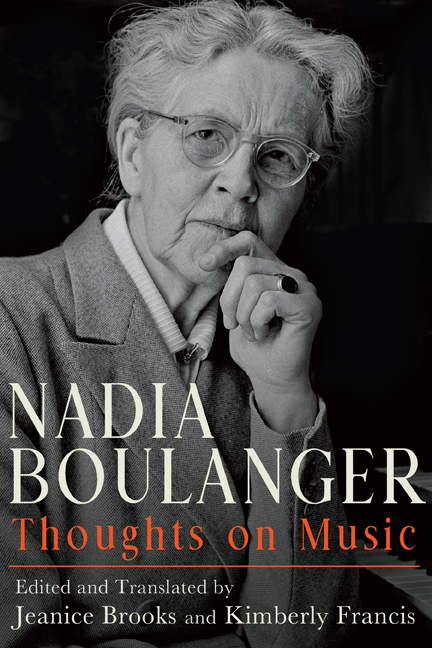Book contents
- Frontmatter
- Contents
- List of Illustrations
- Acknowledgments
- Editorial Apparatus and Critical Notes
- Note on Translations
- List of Abbreviations
- Timeline of Nadia Boulanger’s Life
- Introduction
- Part One Journalism, Criticism, Tributes
- Part Two Lectures, Classes, Broadcasts
- Bibliography of Nadia Boulanger’s Published Writing
- General Bibliography
- Index
“Modern Music: Taken from the Stenographer’s Transcription of the Lectures.” Le Monde musical 37, no. 2 (February 1926): 59-61; “The Lectures of Mademoiselle Nadia Boulanger at the Ecole Normale de Musique.” Le Monde musical 37, no. 5 (May 1926): 201; and “Nadia Boulanger’s Lectures on Modern Music,” Le Monde musical 37, no. 6 (June 1926): 242-44. (Complete text)
Published online by Cambridge University Press: 15 October 2020
- Frontmatter
- Contents
- List of Illustrations
- Acknowledgments
- Editorial Apparatus and Critical Notes
- Note on Translations
- List of Abbreviations
- Timeline of Nadia Boulanger’s Life
- Introduction
- Part One Journalism, Criticism, Tributes
- Part Two Lectures, Classes, Broadcasts
- Bibliography of Nadia Boulanger’s Published Writing
- General Bibliography
- Index
Summary
Mlle Nadia Boulanger began by establishing the principles of her course in a few words. Laying out the subject, she first insisted on the relativity of the notion expressed by the words Modern Music:
“Music is always evolving, just as life is perpetual evolution, and there is not a complete change or a barrier between the art of yesterday, the art of today, and the art of tomorrow; but a transformation that occurs little by little, in an almost incessant way: since we live from day to day, it sometimes seems to us that this transformation is very great, because old habits have been changed, because we are all very lazy, and it is much easier to stick with something that has been established than to change something about which we have already accepted.
The laws of music are, in certain ways, permanent, in other ways, absolutely changeable. Some discoveries exist at first in an accidental state, as it were, of which the author is not fully aware until after the fact. Not every discovery must be accepted with blind admiration. But it is indispensible, as Schoenberg said so well in the preface to his Treatise on Harmony (and, by an odd coincidence, Mr. G. Rageot in his recent article in Le Temps, concerning general knowledge), to exercise one's curiosity, to protect oneself from intellectual laziness, not to settle for asking music only for superficial pleasures, but also to seek in it superior intellectual joys. The great stumbling block, Schoenberg says, in essence, is our desire for ‘comfort.’ Men search, men try to give a new or renewed sense to life; we have to try to understand them. They are around us, and it is terrible to think that cases exist of people who are very great artists, and they are completely abandoned and completely kept apart from everything, because they say something new; they are condemned without due process, without being heard. ”
After these opening remarks, Mademoiselle Nadia Boulanger came to the technical part of her topic. We will reproduce here some long textual excerpts from the stenographer's notes, joining them together in a summary.
- Type
- Chapter
- Information
- Nadia BoulangerThoughts on Music, pp. 317 - 336Publisher: Boydell & BrewerPrint publication year: 2020



